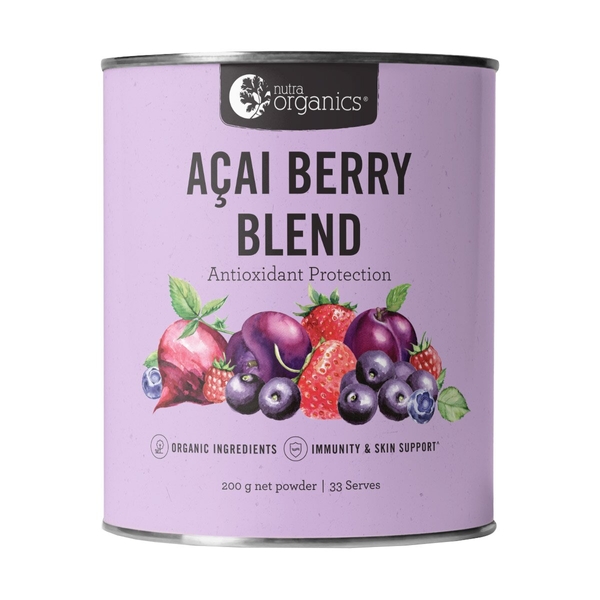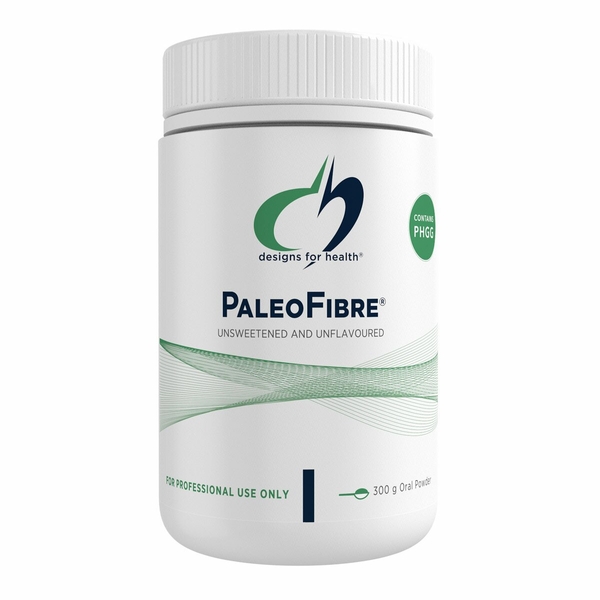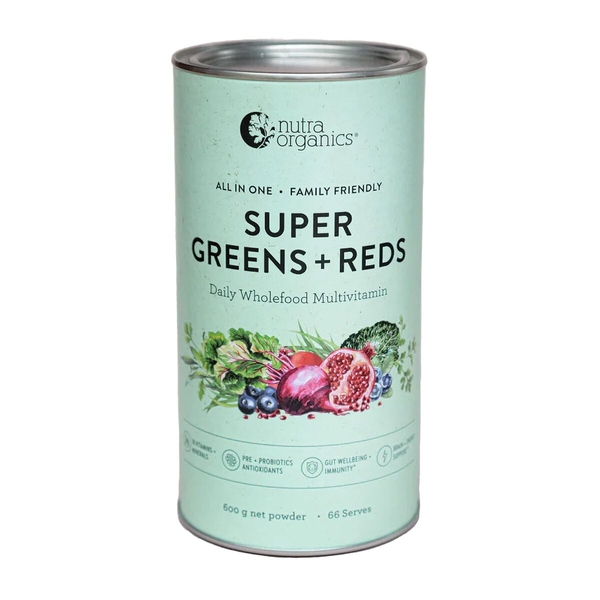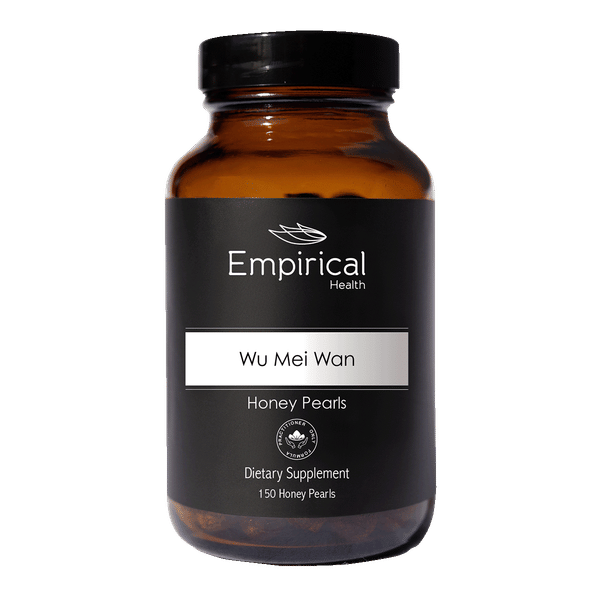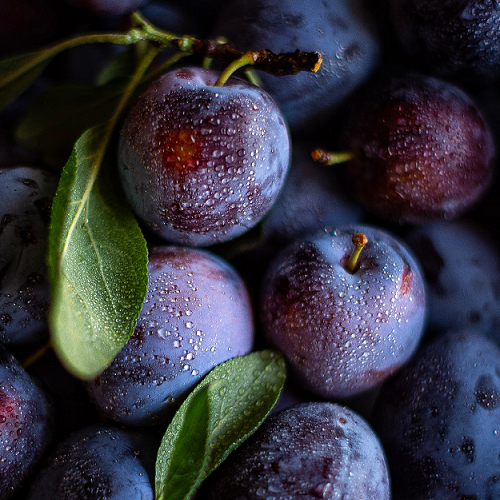
Plum
Scientific names: Prunus domestica, Prunus salicina
Family: Rosaceae
Alternate names: Asian Plum, Black Splendor Plum, Bullace Plum, California Plum, Damson Plum, Dried Plum, European Plum, French Plum, French Plum cv d'Agen, French Prune, Gage, Gardalu, Garden Plum, Greengage, Italian Prune Plum cv President, Italian Prune Plum cv Sugar, Japanese Plum, Oriental Plum, Plum Juice, Prune, Prune Essence, Prune Juice, Prune Plum, Queen Garnet Plum, Stanley Plum, Ussarian Plum, Wild Plum, Willow-Leaf Cherry, Yellow Plum
Actions: General, Anticancer, Antimicrobial, Appetite, Bone, Cardiovascular, Gastrointestinal, Immune, Neuroprotective
Background
The plum is a fruit. There are over 40 species of plum. The most common are Prunus domestica and Prunus salicina. Dried plums are called prunes.
Fresh and dried plums contain fiber and other chemicals that might help with constipation. Dried plum also contains chemicals that seem to reduce bone loss and improve joint health.
People use dried plums for constipation, osteoporosis, high blood pressure, high cholesterol, and many other conditions, but there is no good scientific evidence to support most of these uses.
Don't confuse plum with Japanese Apricot. These are not the same.
Fresh and dried plums contain fiber and other chemicals that might help with constipation. Dried plum also contains chemicals that seem to reduce bone loss and improve joint health.
People use dried plums for constipation, osteoporosis, high blood pressure, high cholesterol, and many other conditions, but there is no good scientific evidence to support most of these uses.
Don't confuse plum with Japanese Apricot. These are not the same.
Safety Safety definitions
When taken by mouth: Plums are commonly consumed in food. Plum is possibly safe when used as medicine for up to 12 months. Plum might cause stomach issues like gas and diarrhea. If dried plums or pits are swallowed whole, they might block the intestines.
Allergy to plants in the Rosaceae family: People who are allergic to other plants in the Rosaceae family, including apricots, peaches, and cherries, might also be allergic to plum.
Special Precautions & Warnings:
Pregnancy and breast-feeding: Plums are commonly consumed in food. There isn't enough reliable information to know if plum is safe to use in larger amounts as medicine when pregnant or breast-feeding. Stay on the safe side and stick to food amounts.Allergy to plants in the Rosaceae family: People who are allergic to other plants in the Rosaceae family, including apricots, peaches, and cherries, might also be allergic to plum.
Effectiveness
NatMed Pro rates effectiveness based on scientific evidence according to the following scale: Effective, Likely Effective, Possibly Effective, Possibly Ineffective, Likely Ineffective, Ineffective, and Insufficient Evidence to Rate.
Possibly effective Effectiveness definitions
- Constipation. Consuming dried plums, plum juice, or plum puree seems to improve constipation. It seems to work as well as psyllium.
Dosing & administration
Whole plums, dried plums, and plum juice are commonly consumed in foods.
As medicine, dried plums have most often been used by adults in doses of 50-100 grams by mouth daily for up to 12 months. Speak with a healthcare provider to find out what dose might be best for a specific condition.
As medicine, dried plums have most often been used by adults in doses of 50-100 grams by mouth daily for up to 12 months. Speak with a healthcare provider to find out what dose might be best for a specific condition.
Interactions with pharmaceuticals
Medications that slow blood clotting (Anticoagulant / Antiplatelet drugs)
Interaction Rating=Moderate Be cautious with this combination.
Plum might slow blood clotting. Taking plus along with medications that also slow blood clotting might increase the risk of bruising and bleeding.
Interactions with herbs & supplements
Herbs and supplements that might slow blood clotting: Plum might slow blood clotting and increase the risk of bleeding. Taking it with other supplements with similar effects might increase the risk of bleeding in some people. Examples of supplements with this effect include garlic, ginger, ginkgo, nattokinase, and Panax ginseng.
Interactions with foods
There are no known interactions with foods.
Products
View all productsPer 6 g:
RRP: $54.95$46.71Save: 15%
Create account
Per 5 g:
- Prunus domestica powder (Prune)
- Cyamopsis tetragonoloba (Partially hydrolysed guar gum (PHGG))
- Bambusa vulgaris (fibre)
- Cichorium intybus (root) (Chicory)
- Malus (fibre) powder (Apple)
- Glucomannan powder
- Linum usitatissimum (seed) flour (Flaxseed)
- Plantago ovata (husk) (Psyllium)
- Daucus carota powder (Carrot)
- Apple pectin
- Vaccinium macrocarpon
- Acacia sp. (gum)
Practitioner product
Per 9 g:
- Prunus salicina (Queen Garnet plum)
- Chlorella pyrenoidosa powder
- Brassica oleracea var. acephala (leaf) powder (Kale)
- Inulin (Dietary fibre)
- Medicago sativa
- Brassica oleracea var. italica (Broccoli)
- Spinacia oleracea (Spinach)
- Green banana
- Bacillus coagulans (GBI-30)
- Arthrospira platensis (Spirulina)
- Laminaria digitara (Kelp)
- Euterpe oleracea (berry) ext. (Acai)
- Vaccinium corymbosum
- Malpighia glabra
- Beta vulgaris
- Punica granatum juice dry
- Lycium chinese
- Golden pea protein (sprout) bio-fermented
- Apple pectin
- Rubus idaeus (berry)
- Fragaria ananassa (Strawberry)
- Hippophae rhamnoides
- Lycopersicon esculentum
- Arctic sea algae
- Sea salt
- Sunflower seed extract
- Ananas comosus (Pineapple)
- Citrus limon (Lemon)
- Linum usitatissimum (seed) (Flaxseed)
- Malus (Apple)
- Lepidium meyenii
- Natural flavours
- Silybum marianum
- Equisetum arvense
- Centella asiatica
- Glycyrrhiza glabra (root)
- Althaea officinalis (root)
- Melissa officinalis
- Taraxacum officinale (leaf)
- Zingiber officinale (root)
- Withania somnifera
- Aloe barbadensis (leaf)
- Panax ginseng
- Pumpkin powder
- Sweet potato powder
- Sunflower seed
- Vaccinium macrocarpon
- Grifola frondosa (mushroom)
- Lentinula edodes (mushroom)
- Myrciaria dubia (fruit) powder (Camu Camu)
- Protease
- Amylase enzyme
- Lipase
- Cellulase
- Lactase
- Mesquite (pod) powder
- Thaumatin
- Chlorella pyrenoidosa powder
RRP: $139.95$118.97Save: 15%
Create account
Per pearl:
- Fructus mume (Wu Mei) (fruit)
- Coptis chinensis (rhizome)
- Zingiber officinale (rhizome)
- Panax ginseng (root)
- Phellodendron amurense (bark)
- Angelica polymorpha (root)
- Pericarpium Zanthoxyli (fruit)
- Oryza sativa (Rice)
- Herba asari
- Aconite (root)
- Cinnamomum cassia (bark) (bark)
- Mel mellis (Feng Mi)
Practitioner product
vital.ly has licensed monographs from TRC Healthcare.
This monograph was last reviewed on 12/09/2024 10:00:00 and last updated on 01/12/2020 22:45:07. Monographs are reviewed and/or updated multiple times per month and at least once per year.
Natural Medicines disclaims any responsibility related to medical consequences of using any medical product. Effort is made to ensure that the information contained in this monograph is accurate at the time it was published. Consumers and medical professionals who consult this monograph are cautioned that any medical or product related decision is the sole responsibility of the consumer and/or the health care professional. A legal License Agreement sets limitations on downloading, storing, or printing content from this Database. No reproduction of this monograph or any content from this Database is permitted without written permission from the publisher. It is unlawful to download, store, or distribute content from this site.

